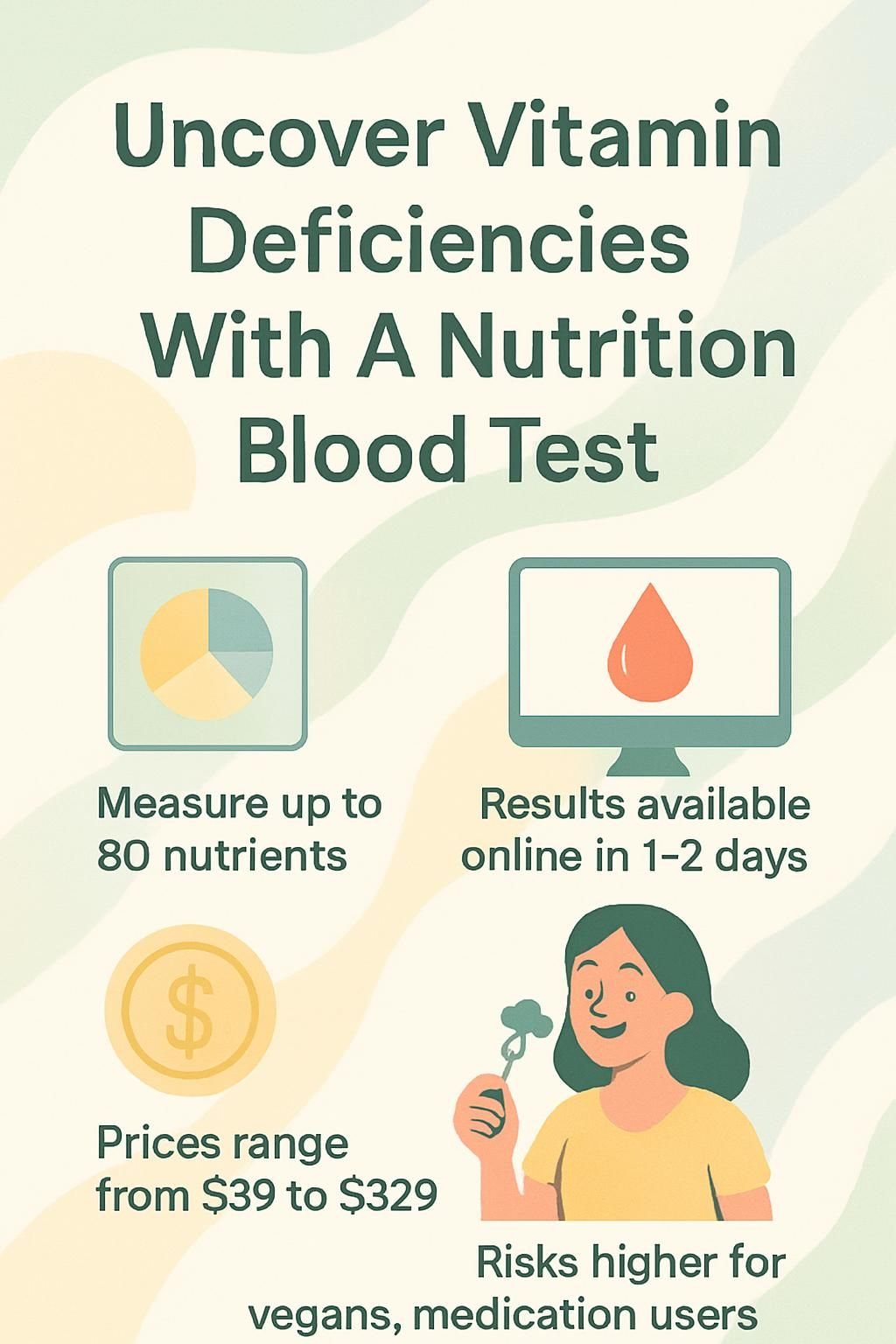Uncover Vitamin Deficiencies With A Nutrition Blood Test
Our Nutrition Assistant AI Suite will transform your body. You will lose fat, get toned, and build muscle. Gain confidence and optimal health.
Feeling tired, moody, or weak can point to a nutrition problem that is easy to miss. A nutrition blood test checks for vitamin and mineral gaps, also called nutrient deficiencies, before they grow into bigger issues.
With clear options from Labcorp OnDemand and Quest, you can measure key nutrients like vitamin D and iron and act before symptoms worsen. This guide shows how the tests work, what they measure, and why early detection supports better health and steady energy.
Take the simple steps ahead to protect your energy and wellness.
Key Takeaways
- Nutrition blood tests from Labcorp OnDemand and Quest measure key vitamin and mineral levels. These panels flag deficiencies in vitamin D, B12, iron, magnesium, calcium, and zinc before symptoms get worse.
- Common signs include fatigue, hair loss, brittle nails, mood swings, and digestive troubles. Early testing helps prevent chronic problems such as anemia or bone loss.
- Comprehensive panels range from $39 to $329 and may assess up to 80 nutrients, including antioxidants like selenium and copper. Results are processed in CLIA certified labs and posted online in about 1 to 2 days.
- People who follow vegan diets or take medications like proton pump inhibitors face higher risk for nutrient gaps. Targeted testing is more accurate than guessing about supplements.
- Healthcare providers suggest regular nutrition testing for adults with specialized diets, malabsorption conditions such as Crohn’s disease, or long term medication use as part of preventive care.

What Is a Nutrition Blood Test?

A nutrition blood test measures the levels of essential vitamins and minerals in your body. This health test gives a snapshot of your nutritional status and helps identify deficiencies early.
What is a nutrition blood test and why is it done?
Nutrition blood tests, sometimes called micronutrient or deficiency tests, measure levels of key vitamins, minerals, and related markers in your blood. Providers use these tests to check for shortages such as low vitamin D or B12 and mineral problems such as iron or magnesium.
These panels help find gaps that can affect your immune system, energy, and long term risks like bone loss or anemia. Testing is common if you have symptoms linked to nutrient shortfalls or follow a diet that limits certain foods, such as a vegan plan.
For example, Labcorp’s Vitamin Deficiency Test includes vitamin D, B12, and folate. Quest offers similar panels that focus on specific areas of nutritional status.
How does a nutrition blood test work?
Testing usually starts with a quick blood draw from your arm. Certified laboratories such as Labcorp or Quest then measure essential nutrients, including vitamin B12, vitamin D, calcium, iron, and zinc.
Some at home options, like 5Strands, use a finger prick or hair sample kit. You mail your sample with the prepaid label included in the box.
Labcorp OnDemand lets you purchase a panel online, give your sample at home or at one of more than 2,000 U.S. locations, and view results in your Labcorp Patient account in about 1 to 2 days after the lab receives your sample.
All testing uses CLIA certified labs. CLIA is a U.S. program that sets quality standards for laboratories. Many panels also measure magnesium and fatty acids such as omega 3 and omega 6.
For urgent questions, Labcorp can share results by phone or mail.
A single tube of blood can reveal hidden deficiencies before symptoms show up.
Testing checks vitamin and mineral status so you can target your nutrition for better health. Some companies offer broad blood work. Others use hair analysis with clear product details listed on their specifications.
Most procedures are quick and low pain, yet they can guide smart use of diet and supplements.
Why Test for Vitamin Deficiencies?
Vitamin and mineral deficiency tests help you find gaps before they harm daily life. Nutritional testing provides clear data on essential nutrients so you can plan a diet that fits your needs.
Why is balanced nutrition important?
Balanced nutrition keeps your energy steady, supports your immune system, and helps your body heal. Getting enough vitamins and minerals through daily food lowers the risk of chronic disease.
Labcorp notes that regular nutritional testing supports wellness and healthy aging by catching problems early. For example, low vitamin D or iron may cause fatigue or reduce immune defense.
Many people develop deficiencies due to poor eating habits or health conditions like Crohn’s disease, celiac disease, or after gastric bypass surgery. Some medicines also block absorption in the gastrointestinal tract.
Switching to more fruits, vegetables, lean proteins, and whole grains can lift mood and improve focus within weeks.
Understanding the causes of deficiencies gives you tools to protect your health over time.
What causes nutrient deficiencies?
Many factors can lead to deficiencies. Restrictive diets, such as vegan or vegetarian plans, may limit vitamin B12, vitamin D, or iron intake. You might need a focused panel such as the Vegetarian & Vegan Diet Vitamin Deficiency Test Panel from Quest to check these nutrients.
Malabsorption conditions like Crohn’s disease or celiac disease reduce how your small intestine absorbs nutrients. Medicines including corticosteroids and proton pump inhibitors can lower vitamin and mineral levels even if you eat well.
Chronic illness can also reduce appetite or make digestion harder, which raises the risk for malnutrition. Food allergies or intolerances, such as gluten sensitivity or milk allergy, force you to avoid certain groups and may cause gaps in your intake.
Some medications can lower how much calcium or magnesium your body keeps.
Testing after diet changes, such as moving to a plant based plan, often shows where support is needed. For example, you might discover low B12 despite a multivitamin and correct it before fatigue and nerve issues begin.
What Are Common Symptoms of Vitamin and Nutrient Deficiencies?
Many people notice clues such as skin changes or stomach upset. A nutrition blood test can confirm deficiencies and guide your next steps.
Can fatigue and weakness signal a deficiency?
Fatigue and weakness often link to low iron, vitamin B12, or vitamin D. Low iron stores can cause anemia, which leaves you tired and short of breath. A Ferritin Test from Labcorp at $59 checks iron reserves, and the Anemia Test at $189 looks for several causes of tiredness.
Low magnesium or folate can also cause muscle cramps and weakness. A Comprehensive Metabolic Panel at Labcorp for $49 helps review electrolyte balance and related markers.
Working long shifts and still feeling weak is a common story. A vitamin deficiency panel can uncover a low B12 level so you can correct it and regain energy.
How do hair loss and brittle nails relate to nutrition?
Hair and nails reflect your nutrient intake. Hair loss and brittle nails often point to a lack of iron, zinc, biotin, or protein.
Low iron, checked with the Iron, TIBC & Ferritin Panel at Quest for $59, can lead to thinning hair. A Biotin Test at Quest for $79 can help if you notice nail breakage or more hair shedding.
Zinc is another key factor. Labcorp’s Zinc Test costs $69 and Quest’s is $59. The 5Strands Nutrition Test reviews more than 80 nutrients tied to hair and nail strength and can help you target what to fix.
Calcium supports nail structure. Labcorp’s Calcium Test is $79. Tests for selenium and copper can show whether those micronutrients impact hair follicles. Tracking these numbers points you toward the right diet or supplement changes for healthier skin, stronger nails, and thicker hair.
What mood changes may indicate a deficiency?
Mood swings, low mood, and irritability can signal nutrient deficiencies. Low B vitamins, especially B12 and folate, may raise the risk for depression or brain fog.
Vitamin D also affects mood. Labcorp’s vitamin D test is $99 and Quest’s is $75. Low iron, low magnesium, and out of balance omega 3 fatty acids add to mental health concerns. Magnesium shortages are linked to irritability. Iron deficiency can cause tiredness plus low drive or sadness.
Quest’s Depression Nutrient Deficiency Panel costs $269 and checks 11 nutrients tied to mood. Hormone changes also play a role. Labcorp’s Estradiol (E2) Test and Menopause Test can be helpful for some women.
Regular testing helps you manage symptoms connected to your nutritional status, then adjust your diet with confidence.
Can digestive issues be a sign of nutrient lack?
Digestive problems such as bloating or diarrhea can signal low vitamin B12, iron, calcium, or magnesium. If you have Crohn’s disease or another absorption issue, your body may not take in fat soluble vitamins A, D, E, and K very well.
You can use Labcorp’s Celiac Disease Antibody Test for $119 to check if gluten sensitivity is involved. Quest’s Inflammatory Bowel Disease Nutrient Deficiency Panel at $172 reviews losses linked to gut problems.
Low magnesium and vitamin D often appear in people with ongoing stomach issues. You can order individual tests online through Labcorp OnDemand.
Food allergies can also play a part. Quest’s Milk Allergy Nutrient Deficiency Panel at $124 checks common risk areas like calcium or vitamin D. Getting both urine testing and a blood panel can show how digestion influences nutrient status, which helps you plan diet and supplements that fit your needs.
Key Nutrients Measured in a Nutrition Blood Test
A nutrition blood test looks at vitamins, minerals, and antioxidants to show your current nutritional status. Think of it as a dashboard for your body’s fuel and repair systems.
Vitamins tested: Vitamin D, B12, A, C, E, and K
Vitamin panels measure nutrients that support many body functions. Testing can find low levels of vitamin D, B12, A, C, E, and K by measuring them directly in your blood.
Labcorp’s Vitamin Deficiency Test includes vitamin D, B12, and folate for $169. You can choose a vitamin D only test for $99 at Labcorp or $75 at Quest.
To check single vitamins, Labcorp offers a Vitamin B12 Test for $49, Vitamin A for $59, and Vitamin C for $59. Vitamin E is available for $69. Some broader panels include vitamin K and other fat soluble vitamins to give a fuller picture.
Online patient portals, such as Labcorp Patient, provide secure and easy to read results. Testing supports your goals whether you follow a vegan diet, have a malabsorption condition, or take medicines that affect absorption.
Minerals tested: Iron, Magnesium, Calcium, Zinc
Most panels review four essential minerals: iron, magnesium, calcium, and zinc. These minerals influence energy, muscles, bones, and immune function.
For iron, Quest’s Iron, TIBC & Ferritin panel is $59. Labcorp’s Ferritin Test is also $59. This testing helps find anemia and shows how much iron your body stores.
Magnesium supports muscles and nerves. It costs $39 at both Labcorp and Quest. Calcium matters for heart rhythm and bone strength. It is $79 at Labcorp and $52 at Quest.
Zinc helps with wound healing and immune support. Labcorp’s test is $69 and Quest’s is $59. Labcorp’s Micronutrient Test at $239 combines vitamins and minerals in one comprehensive panel for adults who want a wide review.
Antioxidants tested: Selenium, Copper
Many micronutrient panels include selenium and copper. Labcorp’s Micronutrient Test evaluates both to give a broader picture of nutrient balance.
Selenium testing at Labcorp costs $109 and connects to immune and thyroid function. Copper levels help show oxidative stress, which reflects how your cells handle wear and tear.
Low selenium or copper may raise risks for immune problems or thyroid concerns. Some autoimmune conditions tie into low antioxidant status. Testing in a CLIA certified lab helps you act on accurate data with a plan for diet or supplements.
What Are the Benefits of a Nutrition Blood Test?
A nutrition blood test can spot imbalances early and give you practical steps for change. It offers clear information you can use to adjust food and supplements with purpose.
How can it identify hidden deficiencies?
These panels detect hidden gaps by measuring vitamins, minerals, and antioxidants before symptoms appear. Labcorp’s Micronutrient Test at $239 checks vitamin D, B12, iron, magnesium, selenium, and more.
Some panels look for mild shortages that still affect daily life. For example, Labcorp’s Fatigue Test at $159 focuses on nutrition related drivers of tiredness.
Results help doctors flag problems early and advise targeted changes. If you prefer a non blood option, the 5Strands Nutrition Test uses hair analysis to review more than 80 nutrients for patterns tied to diet or lifestyle.
How can it help optimize diet and supplements?
After you find gaps, you can fine tune meals and supplements. Results point to foods rich in the missing nutrients and guide smart use of fortified foods.
For example, if your 25 hydroxy vitamin D level is low, adding fatty fish or a vitamin D supplement is more effective than guessing. Panels from Labcorp and Quest also include options designed for vegan diets, milk allergy, or low carb plans.
If a test shows too much of a nutrient such as iron or zinc, you can reduce doses to avoid side effects. Regular follow up tests, such as Labcorp’s Weight Management Baseline at $149 or Tracking Test at $89, let you see progress and avoid overcorrecting.
Can it help prevent chronic diseases?
Correcting deficiencies lowers the risk for long term problems such as anemia, osteoporosis, heart disease, and related complications. Vitamin D testing supports bone strength and may reduce fracture risk.
Labcorp’s Comprehensive Heart Health Test at $329 reviews cholesterol and inflammation markers. These factors influence cardiovascular risk. The Diabetes Risk Test at $39 checks HbA1c, which reflects average blood sugar over three months. Quest’s Thyroid Disorder Nutrient Deficiency Panel at $149 focuses on nutrients tied to thyroid health.
Routine monitoring gives early warnings so you can adjust your diet before a small gap becomes a bigger concern. CLIA certified labs protect your privacy and deliver reliable data you can act on.
How does it support overall health and wellness?
Nutrition blood tests give you clear numbers for vitamins and minerals. For example, an annual wellness panel from Labcorp can review vitamin D, B12, iron, magnesium, calcium, and zinc together.
If your levels fall outside the normal range, you may face more fatigue or frequent illness. Results show where your diet needs support, which helps you choose food or supplements that match your needs.
Regular testing works as preventive care because early detection helps you correct issues before they lead to major problems. Quick access through at home kits or the Labcorp Patient portal makes it easy to track changes and work with your clinician over time.
Popular Vitamin and Nutrient Deficiency Panels
Popular panels make it easier to choose a starting point. A quick check of what each panel includes helps you pick the best fit for your goals.
What is included in a Vitamin D test?
A vitamin D test measures 25 hydroxyvitamin D, the main form used to check vitamin D status. Labcorp’s test costs $99 and Quest’s is $75. Results help assess bone health and calcium absorption, and low values can also affect mood and immunity.
These tests are performed in CLIA certified labs with strict quality checks. Many people choose this panel if they get little sunlight or have risks for low vitamin D. Broader panels, such as Labcorp’s Vitamin Deficiency Test, add B12 and folate for more insight.
Next, look at the Iron, TIBC & Ferritin panel to see how it measures red blood cell health and iron stores.
What does the Iron, TIBC & Ferritin panel measure?
This panel reviews three markers: iron in your blood, total iron binding capacity, and ferritin. Iron shows current circulating levels. Total iron binding capacity, or TIBC, shows how much capacity your blood has to carry iron. Ferritin reflects stored iron.
These markers help spot iron deficiency anemia, which may cause fatigue, hair loss, or poor focus. Quest offers this test for $59. Labcorp’s stand alone ferritin test is $59. Results guide food choices and supplements, and support regular monitoring if you follow a restrictive diet.
What does the Vitamin B12 & Folate test check?
This test measures vitamin B12 and folate, also called vitamin B9. Both help your body make DNA and red blood cells, and they support nerve function.
Low levels can cause fatigue, anemia, numbness, and trouble concentrating. Testing is helpful if you follow a vegan diet, take certain medicines, or have malabsorption conditions such as celiac disease.
Labcorp’s combined Vitamin B12 and Folate Test is $89 and their broader Vitamin Deficiency Test is $169. Quest offers a similar test for $82. Results can explain ongoing tiredness or nerve symptoms and point you toward better food or supplement choices.
Why test for Magnesium levels?
Magnesium is vital for nerves, muscles, and heart rhythm. Low magnesium can cause cramps, fatigue, weakness, or an irregular heartbeat. It may also affect bone health and mood.
Digestive disorders, poor diet, and certain medications can reduce magnesium levels. Labcorp and Quest each charge $39 for a Magnesium Test. Many broad panels include magnesium, so you can track it along with other key markers.
Your results guide food and supplement steps that support better outcomes for adults and teens. Testing keeps the process simple and avoids guessing.
What is measured in an Omega-3 & 6 fatty acid test?
Fatty acid balance tells you about inflammation and cardiovascular risk. Quest’s Omega 3 & 6 Ratio Test Panel measures omega 3 fatty acids such as EPA and DHA, and omega 6 fatty acids like linoleic acid.
Results show whether your balance could raise the risk for inflammation, heart disease, or mood problems. The panel costs $79. If omega 3 is low, you might increase fish intake or consider a fish oil supplement.
Who Should Consider a Nutrition Blood Test?
You might benefit from testing if you notice warning signs or follow a diet that limits certain foods. Testing is also helpful if medicines or medical conditions affect absorption.
Who shows symptoms of nutrient deficiency?
People often experience fatigue, hair loss, brittle nails, mood swings, or digestion problems when nutrients are low. Slow healing and frequent infections also point to possible deficiencies. A quick test can confirm the cause and guide next steps.
Labcorp’s Fatigue Test at $159 and Anemia Test at $189 target common symptoms. Quest’s Depression Nutrient Deficiency Panel at $269 supports people with ongoing mood changes.
Broader panels find multiple gaps before they become chronic conditions. Early action lets your provider suggest the right diet and supplementation plan for your situation.
Who follows restrictive or specialized diets?
Vegans, vegetarians, and adults on low carb plans may have specific gaps. Without animal foods, vitamin B12, iron, and omega 3 fatty acids are often low.
Labcorp panels commonly include B12 and iron. Quest offers a Vegetarian & Vegan Diet Vitamin Deficiency Panel for $209.60 and a Low Carb Diet Panel for $225.60. Food allergies, such as milk allergy, can limit calcium or vitamin D intake. Quest’s Milk Allergy Nutrient Deficiency Panel is $124.
If you avoid fish, an Omega 3 & 6 Ratio Test can help. Testing shapes a smart supplement plan instead of guessing and wasting money.
Summary: Specialized diets raise the chance of certain deficiencies because key foods are limited. Blood tests provide targeted insights so you can address your needs quickly and accurately.
Who has malabsorption conditions?
People with malabsorption struggle to absorb nutrients from food. Conditions include celiac disease, Crohn’s disease, and chronic pancreatitis. Symptoms can include fatigue, weakness, and hair loss.
People with a history of gastrointestinal surgery or long term digestive issues should monitor absorption closely. Medicines that affect digestion can add to the risk. Testing helps you and your clinician track levels and make informed changes.
Who takes medications affecting nutrient absorption?
Certain medicines alter how your body absorbs nutrients. Corticosteroids can reduce calcium and some vitamins over time. Calcium channel blockers may change how your gut absorbs nutrients. Proton pump inhibitors used for reflux reduce stomach acid, which your body needs to absorb magnesium and vitamin B12.
Your nutrition status can shift even with a balanced diet if you take these drugs long term. Research has linked proton pump inhibitor use with deficiencies in magnesium and B12 within a year of steady treatment, according to the National Institutes of Health.
A nutrition blood test can detect gaps early so you can adjust food or supplements with your provider’s guidance.
How to Interpret Nutrition Blood Test Results
Understanding your report helps you decide what to do next. Your results show whether levels are within the lab’s reference range or outside it.
What are normal vs. abnormal nutrient levels?
Normal levels show that your body has enough vitamins and minerals to support daily functions. For example, if vitamin D, B12, iron, or magnesium fall within the lab’s reference range, you likely meet daily needs.
Abnormal levels can signal problems that affect your health. Low values may cause fatigue, weakness, or brittle nails. High levels can also be harmful. Reviewing results with a healthcare professional helps you decide what to change and how to monitor progress.
What do detected deficiencies mean?
A detected deficiency means your body lacks one or more essential nutrients. Common findings include low vitamin D, B12, iron, or magnesium. Causes range from poor intake to absorption issues or side effects from medicines.
Symptoms such as fatigue, headaches, weakness, hair loss, and brittle nails often appear before testing confirms the cause. With early detection, you can correct gaps with diet changes and supplements, and reduce risks tied to malnutrition and chronic disease.
What are the next steps after results?
Meet with a healthcare professional to discuss your report. Your provider will explain vitamin and mineral levels, including vitamin D, B12, iron, and magnesium, and how they relate to your symptoms.
You may get advice on food choices or a supplement plan. Track the symptoms that led to testing, such as fatigue or digestive issues, and note changes after you adjust your diet. Follow up testing in several weeks or months can confirm that your plan is working.
How to Choose the Right Test
Picking the right panel helps you focus on your goals and avoid extras you do not need. A short checklist can speed your choice.
How to identify your health goals?
Start with your main concerns. Think about your energy, mood, sleep, and any symptoms such as hair loss or frequent illness. If you feel tired often, consider tests that check B12 or iron first.
Review your diet, medical history, and medicines. If you follow a restrictive pattern, you may need a panel that looks at a wider set of nutrients. Clear goals help your provider match tests to your needs.
How to review test panels and their focus?
After you set goals, compare panels from Labcorp OnDemand and Quest Diagnostics. The Micronutrient Test measures essentials such as vitamin D, B12, iron, magnesium, zinc, selenium, and copper in one panel. The Vitamin Deficiency Test focuses on vitamins such as D3, B12, and folate.
Read the test descriptions and confirm the markers included. If you follow a restrictive diet or have symptoms that suggest more than one deficiency, consider a broader panel. Tailored results help you adjust supplements without guessing.
Why consult with a healthcare provider?
Professional guidance helps you avoid confusion and keeps you safe. Providers interpret your numbers using medical guidelines, then suggest realistic diet changes or supplements. For example, treating a low vitamin D level requires the right dose, since too much can cause harm.
Clinicians also look for hidden issues that affect how your body absorbs or uses nutrients. This whole picture approach leads to safer, better decisions.
Source for dosing guidance: National Institutes of Health Office of Dietary Supplements and Centers for Disease Control and Prevention, cdc.gov/nutrition.
How to Perform a Nutrition Blood Test
A nutrition blood test starts with a simple sample collection, either in a clinic or at home. Certified labs analyze your sample and post results online.
What are the steps for lab or at-home testing?
Purchase a lab test online through Labcorp OnDemand. No office visit is required. Choose an at home kit or schedule a visit at a Labcorp site.
Follow the instructions for your sample type. Blood tests may use a draw at a site, and 5Strands kits may use hair. Mail your sample in the provided box and track it online.
Log in to your Labcorp Patient account to view results securely. If the lab finds urgent issues, the team may contact you by phone or mail for quick follow up.
Using both methods is common. Many people prefer online portals to track vitamin D, iron, and other markers without long waits.
Why use certified laboratories?
Certified labs follow strict protocols and use advanced tools to deliver accurate results. They meet regulatory standards, so your healthcare professional can trust the data.
Using a certified lab reduces errors in your report. Companies such as 5Strands meet quality assurance guidelines for testing. Clear, reliable results help you and your provider make better decisions about vitamins and minerals like D, B12, A, C, E, K, iron, and magnesium.
Frequently Asked Questions
Here are concise answers to common questions people ask before testing.
Are nutrient blood tests accurate?
Nutrient blood tests done in CLIA certified labs show high accuracy. Tests for vitamin D, B12, and folate measure levels directly in your blood. Laboratories follow strict procedures to keep results consistent and reliable.
You can access secure digital results soon after processing. Both at home kits and lab visits offer flexibility while keeping quality high. A healthcare professional can explain what your results mean and how to act on them.
How often should nutrient levels be tested?
Testing frequency depends on your health, diet, and risk factors. If you have a history of deficiencies or follow a restrictive diet, schedule regular checks. People with conditions that reduce absorption, such as celiac disease or Crohn’s disease, may need more frequent testing.
Many providers suggest every three to six months if you are correcting a deficiency, and yearly for routine checks if you are stable. If you notice fatigue, hair loss, or mood changes, test sooner to catch problems early.
Can diet alone resolve deficiencies?
Diet changes often improve mild shortages. For low iron, you might add lean beef, poultry, beans, or spinach. Vitamin C from foods like oranges or bell peppers helps iron absorption. Fatty fish and fortified foods can support vitamin D intake.
Some deficiencies need supplements, especially if absorption is poor due to a medical condition or medication. A healthcare professional can guide dosing and monitor progress with follow up testing.
Conclusion
A nutrition blood test gives you facts about your vitamin and mineral needs. You can find out what your body lacks before symptoms escalate. Testing leads to smarter diet and supplement choices.
Labcorp OnDemand and Quest make testing simple at home or in a lab. Clear results help you build steady energy, strong immunity, and a stable mood. Use accurate testing to guide your next steps, then follow up with your healthcare provider for safe, effective care.
Health disclaimer: This article is educational and is not medical advice. Always consult a qualified healthcare professional for diagnosis and treatment.
FAQs
1. What is a nutrition blood test and how does it detect vitamin deficiencies?
A nutrition blood test measures the levels of vitamins, minerals, and other nutrients in your bloodstream. This helps identify specific nutrient shortages such as low vitamin D or B12.
2. Which common symptoms might suggest I need a nutrition blood test for vitamin deficiencies?
Symptoms like fatigue, muscle weakness, poor concentration, brittle nails, or frequent illness may signal possible nutrient gaps that can be confirmed with a nutrition blood test.
3. How accurate are nutrition blood tests in identifying vitamin deficiencies?
Clinical studies show these tests provide reliable results when performed by certified laboratories using standardized methods. Results help healthcare providers recommend targeted dietary changes or supplements based on evidence.
4. Can you share an example of how discovering a deficiency through testing improved health?
After experiencing ongoing tiredness despite enough sleep, I took a nutrition blood test that revealed low iron and folate levels. With my doctor’s guidance and new diet choices rich in leafy greens and lean meats, my energy returned within weeks.
Summary: Nutrition blood tests offer precise insights into your body’s nutrient status; they support early detection of hidden deficiencies so you can address them with informed lifestyle adjustments backed by clinical research.







